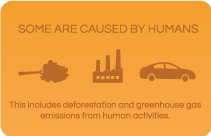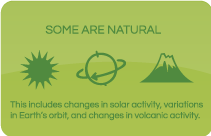What causes climate change? Climate changes are caused by changes in the total amount of energy from the Sun that is kept in the Earth's atmosphere. This change in energy is then distributed around the globe by winds, ocean currents, and other mechanisms to affect the climates of different regions.
Both natural processes and human activities can change the rate of energy absorbed by the atmosphere. Factors that can affect climate change can be divided between feedback and forcing processes. Forcing processes are external factors that can cause changes directly to our climate, where as feedback processes amplify or diminish the effect of climate forcing.
What causes climate change: Forcing
A forcing process changes the proportion of incoming solar radiation and outgoing infrared radiation that is kept in the Earth's atmosphere and so changes the amount of energy within global weather patterns. Forcings are external processes that affect the climate system. Examples of forcings include volcanic eruptions and increased greenhouse gas concentrations.
The Earth's climate has never been completely static and in the past the planet's climate has changed due to natural causes but the climate changes seen today are being caused by the increase of carbon dioxide and other greenhouse gases in the atmosphere by humans.
Let's take a look at the different types of forcings that can affect climate change:
Human sources
- Changes in greenhouse gas concentrations
- Deforestation and land use changes
- Sulfate aerosols
- Soot particles (black carbon)
Natural sources
- Variations in the Earth's orbital characteristics
- Volcanic eruptions
- Variations in solar output
- Natural aerosols
What causes climate change: Feedback
A feedback process interacts with and amplifies the given effect of a climate change forcing. Feedbacks are mechanisms in which one part of the process changes a second part of the process, and the change in the second process then add further changes to the first. A positive feedback intensifies the original effect and a negative feedback diminishes it. Examples of feedbacks include ice cover and water vapor.
Since feedbacks can either increase or reduce the strength of forcing processes, they are important to determine the total effects of the climate changes seen today.
Let's take a look at the different types of feedbacks that can affect climate change:
Natural sources
- Water vapor
- Ice cover reflectivity
- Clouds
More info:
Climate Change: Causes - NASA
Causes of Climate Change - US EPA
What causes the Earth's climate to change? - British Geological Survey
Are human activities causing climate change? - Australian Academy of Science


